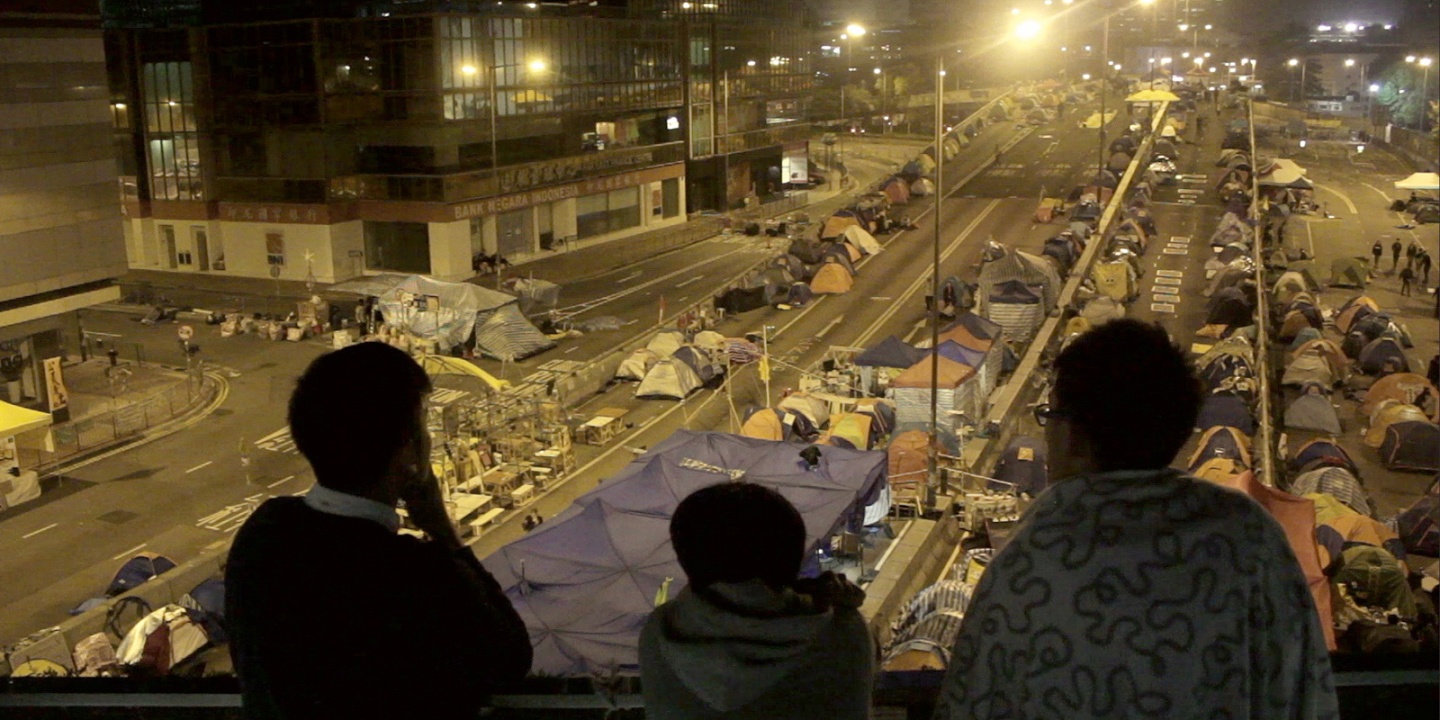by Geoff Webb
The revolution will not be given theatrical release.
At least, not in director Chan Tze-woon’s native Hong Kong, where his eagerly-anticipated documentary Yellowing—a love letter to the romantic idealism of youth and case study of modern dissent—was declared likely to provoke civil unrest and denied the opportunity for public screenings among the film’s subjects.
The story of the Umbrella Movement of the fall of 2014, in which a hundred thousand pro-democracy protestors took to the streets in a months-long occupation of Hong Kong’s busiest intersections, will feel familiar to those who experienced the exasperating futility of the Occupy protests as an existential blow to our romantic psyche here at home. The pain is far more real in undemocratic Hong Kong, where there is a sharp divide between those who want a say and those who want to leave well enough alone. 2 years later, it appears more difficult than ever to speak aloud in Hong Kong.
And yet, a key highlight of Chan’s film is its insistent reminder of the irrepressible hope for change that lives on after the crackdown. And here in Vancouver, where a vibrant culture of change-makers are constantly searching for insights on how to turn the tide in a losing battle against apathy, Yellowing appears to have found its home.
To viewers here in urban Vancouver, the cityscape depicted in the film’s unassuming opening frame will feel quite familiar: in a quiet intersection in Hong Kong, all is perfectly calm. Suddenly, an impossibly bright flash of light illuminates the sky. More bursts of light quickly follow, and waves of crackling thunder echo through the city’s skyscrapers. It is the National Day of the People’s Republic of China, and Hong Kong’s pro-Chinese rulers are putting on a mesmerizing fireworks show. But something is wrong: the showering streams of light from the fireworks are slowly intermingled with visuals of steaming volleys of tear gas. The fireworks drown out the sound, but a frightening clash between protestors and police is taking place. Gas canisters ricochet off crumpled umbrellas hoisted by protestors, and waves of masked figures in riot gear rush toward us, shrouded in smoke and obscured by the chaos of terrified students blinded by the acrid chemicals. A feeling of confusion and despair takes over as the screen fades to black.
With the exception of a decidedly awkward punch delivered to the cameraman off-screen later in the film, this is, thankfully, the most violently dramatic things become. In 2014 Hong Kong, there would be no Tiananmen, no Bloody Sunday, no Katyn massacre. Suppression of the revolt against Chinese rulers is left to the Hong Kong police, and while the filmmaker’s point of view is squarely from the side of the students, we are reminded that, to the protestors, “We are all Hong Kongers. Even if we lose, they will not win.” There is an air of arguing with oneself that continually frustrates everyone involved.
To experience the 79 days of protest through Chan Tze-woon’s eyes is to understand what it is to be truly powerless, and yet exhilarated and emboldened by the resilience of those around you. 16-year olds who have never even dreamed of jaywalking are organizing resource centers, distributing supplies and calmly giving directions designed to avoid panic and congestion through megaphones. But the most touching thing about Yellowing is that it does not idolize its heroes, even as they fawn over their own protestor idols. “Can I ask for his autograph?” the most driven one of them all asks when a popular student spokesperson walks past. “Is that lame?” Others shamelessly admit to their cowardice in the face of an omnipresent enemy, while still others even more shamelessly admit the opposite: “I want to know what it feels like to be arrested.” This boy quickly corrects himself, however: “I would be going to jail for the future of Hong Kong.”
Equally engaging (and enraging) is the rising tide of those who carry blue ribbons in stark contrast of the yellow of the protestors’: those who see the students as rabble-rousing deadbeats sleeping in the street and blocking traffic for lack of anything better to do. Protestors are yelled down and pushed in the street. Chan’s interviews are regularly interrupted by passersby eager to vent their frustration upon the troublemakers. Faced with dwindling numbers and daily attrition towards the end, and teach-ins that continually fail, protestors must admit that a key undermining factor in their struggle is their own complacent upbringing. The surest way to silence a classroom-full of Hong Kongers, we soon learn, is to simply ask: “Does anyone have any questions?”
And yet, this is a resoundingly hopeful film; it is clear that regardless of what happens on the frontline or in increasingly disappointing negotiations, a private war is being won here at street-level. The story of the rise and fall of the 2014 Umbrella Movement is a strange and wonderful one, and Chan Tze-woon has done important work in conveying with candid humour and vitality the story of a few students who braved batons and ridicule in hopes of meaningful change. Let’s hope the right people see it.



